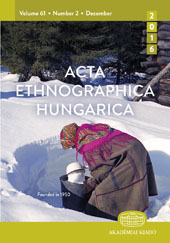CHANGING VINEYARD COMMUNITIES AND POST-PEASANT VITICULTURE AND VINICULTURE
CHANGING VINEYARD COMMUNITIES AND POST-PEASANT VITICULTURE AND VINICULTURE
Author(s): Péter IllésSubject(s): Customs / Folklore, Geography, Regional studies, Agriculture, Civil Society, Cultural Anthropology / Ethnology, Economic development, Socio-Economic Research
Published by: Akadémiai Kiadó
Keywords: vineyard; viniculture; viticulture; community study; contemporary socio-cultural changes; post-peasant society; civil society; sustainable development; rural Hungary; Western Hungary;
Summary/Abstract: The once flourishing viticulture and viniculture in the Vasi-Hegyhát ethnological-historical micro-region, located in the western part of Hungary, extending from the Göcsej hills in the Southwestern Transdanubian region, and the edges of the Őrség micro-region to the Kemenesalja microregion, has deteriorated to merely providing the needs of families. The survival of historical viticulture and viniculture in families, based on self-owned small peasant farms, has become increasingly doubtful since 1990. New generations in villages, succeeding many active wine-making generations, are less keen on wine-making. Lacking motivation and the necessary time and money is an obstacle to the cultivation or development of vineyards on hereditary plots. Vineyards in the Vasi-Hegyhát region are characteristic and inseparable elements of this micro-region and the whole Southwestern Transdanubian area, even if they do not produce quality wines. In Vas, Zala and Somogy counties wine-press houses [pince], consisting of two or three rooms [derék], with walls made of clay, wood, or sometimes stone standing on some tens of hectares of land and their use in their original function are relics of peasant culture in harmony with the landscape. The existing problems and their circumstances deeply affect, one could even say, they reflect the essence of the recent restructuring of local societies in Western Transdanubia. This essay attempts to present the recent situation of peasant viniculture, representing a unique environmental and human value, and its role within communities through the example of the vineyards of two villages, Sótony and Oszkó. The attempts of these small villages – closely linked to vineyards, yet having a different relation to traditions – to find their way help to understand the processes occurring today in rural (civil) societies.
Journal: Acta Ethnographica Hungarica
- Issue Year: 58/2013
- Issue No: 2
- Page Range: 297-313
- Page Count: 17
- Language: English
- Content File-PDF

